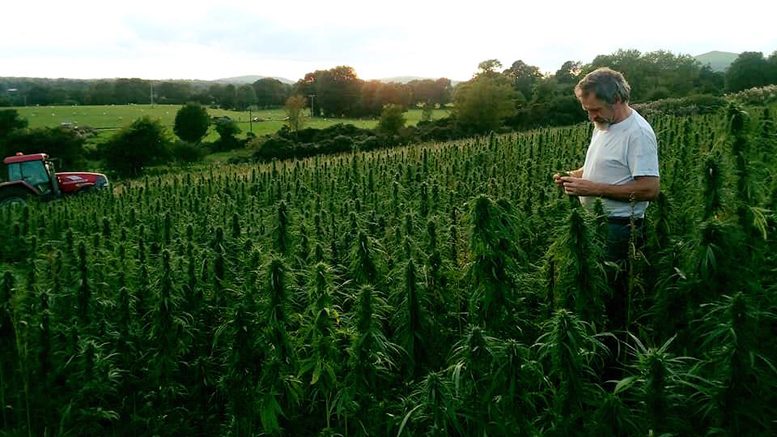Source: villagemagazine.ie
Use of wonder material, hemp, is burgeoning but its potential is being undermined by corporate interests and antiquated legislation

Marcus McCabe in hemp fields at Clones in County Monaghan, Ireland
IRISH AGRICULTURAL policy over the past decade has generated unsustainable levels of dairy and beef production. The national herd is approaching 8 million in number and each cow produces 2 tonnes of harmful emissions per year. Industrial-scale farming has resulted in serious climate and national food-security issues which now must be addressed by incentivising the diversification of agricultural land-use and agricultural food production. The search for viable alternatives, capable of supporting Ireland’s rural economy, has led many farmers to consider the potentials of hemp. Hemp is a high value, cash crop with massive economic potential and it can also deliver substantial environmental benefits.
George Washington and Thomas Jefferson grew hemp and the Declaration of Independence was written on hemp paper. Rudolph Diesel designed his engine to run on hemp oil. Henry Ford experimented with hemp to build car bodies. But it was as good as prohibited in the United States by the Marijuana Tax Act of 1937, until it was in effect revoked in December. Hemp is naturally resistant to most pests, precluding the need for pesticides. Its tight-spacing squeezes out weeds, so herbicides are not necessary. It produces up to four tonnes per acre per year. It also leaves a weed-free field for a following crop.
Hemp thrives without chemical additives or fertilisers and requires minimal use of natural resources. When used as a break crop, hemp significantly increases the yield of rotation crops and as biomass it is a fully renewable energy resource. Hemp promotes biodiversity and ecosystem health in marine environments as well as on land. And a growing body of international research also demonstrates that commercial hemp farming has a significant positive impact on the regeneration of rural communities.
Hemp absorbs more CO2 per hectare than any forest or commercial crop – it is the ideal carbon sink. Its bioremediation and soil-decontamination potential is prolific and its capacity to impact industrial carbon emissions is immense. Hemp is the most complete plant-based protein we have, it contains all nine essential amino acids and has considerable nutritional, health and medicinal properties.
Outside of its enormous potential as biofuel, hemp is currently used in construction, car manufacturing, paper, food, animal-bedding, clothing, drinks, health, pharmaceutical and cosmetics industries, and there are solid indicators that it will replace other carbon intensive processing in a further range of industrial applications. Petrol-based fibreglass, for example, is more than 400% more expensive to produce than hemp-based fibreglass of superior strength and quality. Rapid advances in hemp technology are bringing production costs well below carbon-based equivalents and the industry is now the fastest growing employment provider in the US, outperforming the US tech industry by a ratio of 2:1 in 2017.
The rapid growth of global hemp markets has not by and large followed sustainable development pathways and huge environmental benefits have been squandered. Global policy and regulatory reforms aimed at removing historical barriers to trade – hemp is an agricultural crop with no narcotic value but is treated as a controlled substance – have tended to militate against small, high-quality producers and to favour the growth of corporate actors in the pharmaceutical, drinks and tobacco industries.
Ireland is very well suited to hemp and last year, agricultural activity in the Irish hemp sector increased by more than 200% and over the past few weeks there has been another huge increase in the number of Irish farmers enquiring about HPRA hemp-licencing procedures. Many of these are looking to diversify and view hemp as a viable alternative to carbon-intensive dairy and beef production. However, the lack of even the most rudimentary supply chain to support the growth potential is hugely concerning.
Insufficient technological capabilities and over-restrictive regulatory requirements limit the Irish hemp industry’s capacity to benefit the environment. They fuel negative public perceptions and are constructive barriers to a full realisation of hemp’s environmental potential. Consequently, the Irish hemp industry is perilously underdeveloped and without state support it will not survive the attentions of global giants now poised to enter the European market. The development of new agricultural systems capable of realising Ireland’s climate transition goals must be supported by financial mechanisms to enable Irish farmers to deliver on environmental policy objectives.
The hemp industry requires coordinated development of supply-chain infrastructure to enable a progressive transition toward fully integrated farming and industrial practice consistent with environmental ethics, and capable of realising climate policy objectives. Producer and processor incentives will also be needed to underpin an incubation period, until markets and supply-chains are mature enough to support market-led growth. Measures will be required to educate and inform the public and to promote European and global market penetration of Irish hemp products. It is also hugely important that the forthcoming legislation to allow for access to medical cannabis also protects the environmental, social and rural economic potentials of the Irish hemp industry.
Hemp is the wonder material for our times. It needs only a fair regulatory tail wind.
ReplyDeleteGelato
CBD capsules
THE BEST VAPORIZERS